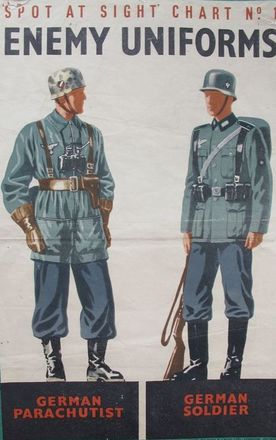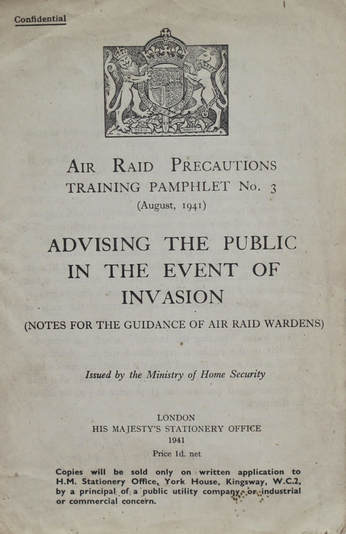|
Invasion Threat, 1942 Alan Payne March 2018 Box's vicar the Rev Arthur F Maltin wrote in 1942: We have entered upon the third year of the war and are now facing another winter. Shall we have to contend with the horrors of night bombing as we did last year? (We hope) that we can minimise the terrors of the night raider, either by destroying him, or dealing more effectively with his attempts to burn Britain.[1] The year started off badly when in February Singapore surrendered to Japan with 130,000 British Empire troops captured. Worse soon followed at home. Soon it was Bath that was being bombed and burnt and the war spilled over into Box as a rescue centre. Right: The threat of invasion by air encouraged the government to issue public notices to identify German uniforms (courtesy Eric Callaway) |
Invasion Threat
By April 1942, fears of a German invasion were rife. An emergency committee was formed comprising the Rev Maltin, Mr Finnes of The Bassetts, Mr Wilkinson of Ashley House and Mr Chapman Webb. The Scout Headquarters, doubling up as the Headquarters of the Home Guard, was the central point for the defence of the village. In September 1942, a lecture was given in Bath by Major-General Lindsay, the Deputy Regional Commissioner for Civil Defence on the subject of If Invaders Come we Must Know What to Do.[2]
By April 1942, fears of a German invasion were rife. An emergency committee was formed comprising the Rev Maltin, Mr Finnes of The Bassetts, Mr Wilkinson of Ashley House and Mr Chapman Webb. The Scout Headquarters, doubling up as the Headquarters of the Home Guard, was the central point for the defence of the village. In September 1942, a lecture was given in Bath by Major-General Lindsay, the Deputy Regional Commissioner for Civil Defence on the subject of If Invaders Come we Must Know What to Do.[2]
|
In the immediate aftermath many people had to sleep in tents and caravans at Bathford and Batheaston until the 1942 cattle foot-and-mouth epidemic resulted in the clearance of these sites.[3] By 1943 most of the 727 people made homeless by the blitz had been re-housed, mostly in temporary accommodation. Bill Cooper Remembers Bomb Craters Bombs in Box I remember going with the gang to Road Hill to inspect the crater of a stray bomb, on the right hand side going up. It was guarded by the Home Guard but a vast number of the youth of Box went there. Why? to collect any pieces of shrapnel, again prized possessions. Left: Public Notice about dealing with invasion (courtesy Eric Callaway) |
The War Turns
The war began to turn in Britain's favour by the middle of 1942. The USA officially entered the war in December 1941 and American servicemen were seen in the streets of Bath as early as February 1942.[4] Most were in RAF uniform with USA or CTC USA (Combined Training Centre) on their shoulders and a few USA Army officers in their sand-coloured slacks and khaki coats.
The Germans had turned their attentions to Eastern Europe with an attack on the Russian Front at Stalingrad. It was in the
Middle East that success came with the defeat of the Germans at El Alamein in October and November 1942. Churchill ordered that church bells should be rung throughout the country, the first time that residents of Box had heard them since they were banned in June 1940, except for air raids.
The war began to turn in Britain's favour by the middle of 1942. The USA officially entered the war in December 1941 and American servicemen were seen in the streets of Bath as early as February 1942.[4] Most were in RAF uniform with USA or CTC USA (Combined Training Centre) on their shoulders and a few USA Army officers in their sand-coloured slacks and khaki coats.
The Germans had turned their attentions to Eastern Europe with an attack on the Russian Front at Stalingrad. It was in the
Middle East that success came with the defeat of the Germans at El Alamein in October and November 1942. Churchill ordered that church bells should be rung throughout the country, the first time that residents of Box had heard them since they were banned in June 1940, except for air raids.
In February 1943 the German land attack on Stalingrad was defeated by the Russians at a terrible cost. The war moved into aerial bombardment of civilian targets in an effort to break morale both by the Germans and by Bomber Harris and the British Bomber Command. These young pilots and their crew had at times only a 20% chance of returning.
Bill Cooper Remembers American Servicemen
Another memory is one of two American infantrymen being billeted on us for a few days prior to D-Day. They dished out their badges to my sister and I, which were prized possessions in those days. (I don’t think they survived!).
Another memory is one of two American infantrymen being billeted on us for a few days prior to D-Day. They dished out their badges to my sister and I, which were prized possessions in those days. (I don’t think they survived!).
References
[1] Parish Magazine, October 1941
[2] Bath Weekly Chronicle and Herald, 5 September 1942
[3] Bath Weekly Chronicle and Herald, 16 January 1943
[4] Bath Weekly Chronicle and Herald, 21 February 1942
[1] Parish Magazine, October 1941
[2] Bath Weekly Chronicle and Herald, 5 September 1942
[3] Bath Weekly Chronicle and Herald, 16 January 1943
[4] Bath Weekly Chronicle and Herald, 21 February 1942

